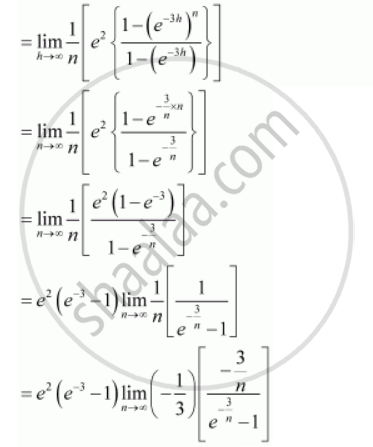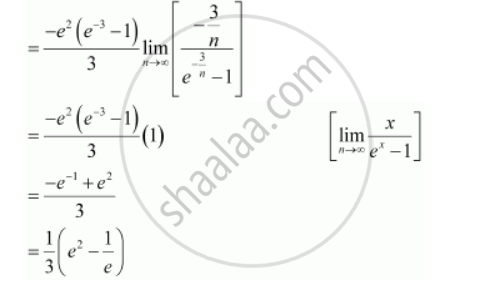Advertisements
Advertisements
Question
Evaluate `int_0^1 e^(2-3x) dx` as a limit of a sum.
Solution



APPEARS IN
RELATED QUESTIONS
Evaluate the following definite integrals as limit of sums.
`int_0^5 (x+1) dx`
Evaluate the following definite integrals as limit of sums.
`int_2^3 x^2 dx`
Evaluate the following definite integrals as limit of sums.
`int_1^4 (x^2 - x) dx`
Evaluate the definite integral:
`int_(pi/2)^pi e^x ((1-sinx)/(1-cos x)) dx`
Evaluate the definite integral:
`int_0^1 dx/(sqrt(1+x) - sqrtx)`
Evaluate the definite integral:
`int_0^(pi/4) (sin x + cos x)/(9+16sin 2x) dx`
Evaluate the definite integral:
`int_0^(pi/2) sin 2x tan^(-1) (sinx) dx`
Prove the following:
`int_0^(pi/2) sin^3 xdx = 2/3`
`int dx/(e^x + e^(-x))` is equal to ______.
If f (a + b - x) = f (x), then `int_a^b x f(x )dx` is equal to ______.
Choose the correct answers The value of `int_0^1 tan^(-1) (2x -1)/(1+x - x^2)` dx is
(A) 1
(B) 0
(C) –1
(D) `pi/4`
\[\int\limits_0^1 \left( x e^x + \cos\frac{\pi x}{4} \right) dx\]
\[\int\frac{\sqrt{\tan x}}{\sin x \cos x} dx\]
Evaluate:
`int (sin"x"+cos"x")/(sqrt(9+16sin2"x")) "dx"`
Evaluate `int_(-1)^2 (7x - 5)"d"x` as a limit of sums
If f and g are continuous functions in [0, 1] satisfying f(x) = f(a – x) and g(x) + g(a – x) = a, then `int_0^"a" "f"(x) * "g"(x)"d"x` is equal to ______.
Evaluate the following as limit of sum:
`int _0^2 (x^2 + 3) "d"x`
Evaluate the following:
`int_0^1 (x"d"x)/sqrt(1 + x^2)`
Evaluate the following:
`int_0^pi x sin x cos^2x "d"x`
Evaluate the following:
`int_0^(1/2) ("d"x)/((1 + x^2)sqrt(1 - x^2))` (Hint: Let x = sin θ)
The value of `int_(-pi)^pi sin^3x cos^2x "d"x` is ______.
If f" = C, C ≠ 0, where C is a constant, then the value of `lim_(x -> 0) (f(x) - 2f (2x) + 3f (3x))/x^2` is
Left `f(x) = {{:(1",", "if x is rational number"),(0",", "if x is irrational number"):}`. The value `fof (sqrt(3))` is
What is the derivative of `f(x) = |x|` at `x` = 0?
Let f: (0,2)→R be defined as f(x) = `log_2(1 + tan((πx)/4))`. Then, `lim_(n→∞) 2/n(f(1/n) + f(2/n) + ... + f(1))` is equal to ______.
The value of `lim_(n→∞)1/n sum_(r = 0)^(2n-1) n^2/(n^2 + 4r^2)` is ______.
`lim_(n rightarrow ∞)1/2^n [1/sqrt(1 - 1/2^n) + 1/sqrt(1 - 2/2^n) + 1/sqrt(1 - 3/2^n) + ...... + 1/sqrt(1 - (2^n - 1)/2^n)]` is equal to ______.
